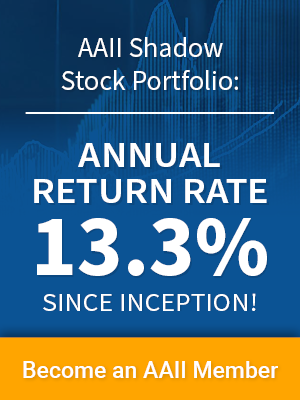Based on key financial metrics such as the price-to-sales ratio, shareholder yield and the price-earnings ratio, the following 3 stocks made the list for top value stocks in the Electric Utilities industry. Those looking for value stocks to add to their portfolio may want to use this list as a starting point for further investment research.
Why Focus on Undervalued Electric Utilities Stocks?
Value investors seek to buy stocks at a discount to their intrinsic value. Long-term returns show that such strategies are advantageous. Value stocks, as a group, tend to outperform growth stocks over extended periods of time. Typically, value investors perform financial analysis of numerous metrics, don’t follow the herd and are long-term investors.
AAII’s A+ Investor Value Grade is derived from a stock’s Value Score. The Value Score is the percentile rank of the average of the percentile ranks of the price-to-sales ratio, price-earnings ratio, enterprise-value-to-EBITDA (EV/EBITDA) ratio, shareholder yield, price-to-book-value ratio and price-to-free-cash-flow ratio. The score is variable, meaning it can consider all six ratios or, should any of the six ratios not be valid, the remaining ratios that are valid. To be assigned a Value Score, stocks must have a valid (non-null) ratio and corresponding ranking for at least two of the six valuation ratios.
What Goes Into AAII’s Value Grade?
Stock evaluation requires access to huge amounts of data as well as the knowledge and time to sift through it all, make sense of financial ratios, read income statements and analyze recent stock movement. AAII created A+ Investor, a robust data suite that condenses data research in an actionable and customizable way suitable for investors of all knowledge levels, to help investors with that task.
AAII’s proprietary stock grades come with A+ Investor. These offer intuitive A–F grades for more than just value. It is possible for a stock to appear cheap based on one valuation metric but appear expensive on another. It is also possible for one valuation ratio to be associated with outperforming stocks during certain periods of time but not others. Some stocks may even have null values for certain metrics like the price-earnings ratio or the price-to-book ratio but not others. An example of this would be a company with losses instead of profits or a negative book value because of heavy borrowing. Negative earnings or book value result in non-meaningful ratios that are left blank or null.
Click the button below to learn more about A+ Investor and subscribe today.

3 Undervalued Electric Utilities Stocks
Of course, there are countless value stocks that are worth mentioning, but this is a concise list of the top 3 undervalued stocks in the Electric Utilities industry for Monday, November 24, 2025. Let’s take a closer look at their individual scores to see how they measure up against each other and the Electric Utilities industry median.
| Company | Ticker | Price/Sales | Price/Earnings | EV/EBITDA | Shareholder Yield | Price/Book Value | Price/Free Cash Flow | Value Grade |
| Edison International | EIX | 1.25 | 7.7 | 8.8 | 6.2% | 1.45 | na | A |
| Emera Incorporated | EMA | 1.66 | 17.9 | 11.4 | 5.9% | 1.65 | na | B |
| Eversource Energy | ES | 1.80 | 17.7 | 9.8 | 1.3% | 1.51 | na | B |
The Value Grade is assigned based on how each stock’s composite valuation compares to all other stocks.
The process for assigning grades starts with each variable for a given stock. The percentile rankings for all valid ratios that a stock has are calculated. So, for instance, a stock could have a price-to-book ranking in the 43rd percentile, a price-earnings ranking in the 67th percentile, a price-to-sales ranking in the 23rd percentile, etc. Then, those rankings are averaged for each stock. (A minimum of two valid variables are required, though all six will be used if available.)
Once the average of the individual variables is calculated, that average is ranked against all stocks. Put another way, each stock’s composite valuation is compared to all other stocks. These ranks are then sorted into quintiles from the cheapest 20% (a grade of A) to the most expensive 20% (a grade of F).
As always, we recommend that you conduct proper due diligence and research before investing in any security. We also suggest that investors utilize numerous grades, not just value, when it comes to deciding whether a company is a good fit for their allocation needs.
Edison International’s Value Grade
Value Grade:
| Metric | Score | EIX | Industry Median |
| Price/Sales | 38 | 1.25 | 2.62 |
| Price/Earnings | 10 | 7.7 | 21.0 |
| EV/EBITDA | 29 | 8.8 | 11.5 |
| Shareholder Yield | 12 | 6.2% | 2.7% |
| Price/Book Value | 42 | 1.45 | 1.89 |
| Price/Free Cash Flow | na | na | 25.0 |
Edison International, through its subsidiaries, engages in the generation and distribution of electric power. The company supplies and delivers through its electrical infrastructure to an approximately 50,000 square-mile area of southern California. It serves residential, commercial, industrial, public authorities, agricultural, and other sectors. The company’s distribution network consists of approximately 13,000 circuit-miles of lines ranging from 55 kV to 500 kV and approximately 80 transmission substations; and approximately 38,000 circuit-miles of overhead lines, approximately 32,000 circuit-miles of underground lines, and approximately 730 distribution substations. Edison International was founded in 1886 and is based in Rosemead, California.
Stocks with a Value Score from 81 to 100 are considered deep value, those with a score between 61 and 80 are value and so on.
Edison International has a Value Score of 88, which is considered to be undervalued.
When you look at Edison International’s price-to-sales ratio at 1.25 compared to the industry median at 2.62, this company has a lower price relative to revenue compared to its peers. This could make Edison International’s stock more attractive for value investors.
Edison International’s price-earnings ratio is 7.70 compared to the industry median at 21.05. This means it has a lower share price relative to earnings compared to its peers. This could make Edison International more attractive for value investors.
Now, let’s assess Edison International’s EV/EBITDA ratio, also known as enterprise multiple. At 8.8, when compared to the industry median of 11.5, the company may be considered undervalued in relation to its peers. Value investors could use the enterprise multiple to identify stocks that are considered overvalued or undervalued relative to their industry.
Shareholder yield is the sum of a stock’s dividend yield (paid over previous 12 months minus special dividends) and the percentage of net share buybacks over the previous 12 months. Edison International’s shareholder yield is higher than its industry median ratio of 2.70%. Value investors may look for an attractive shareholder yield because it can be a powerful tool for identifying if the company has a good management team.
As one of the most common value metrics, the price-to-book ratio evaluates a company’s current market price relative to its book value. Edison International’s price-to-book ratio is lower than its industry median ratio of 1.89. This could make Edison International more attractive to investors looking for a new addition to their portfolio.
Emera Incorporated’s Value Grade
Value Grade:
| Metric | Score | EMA | Industry Median |
| Price/Sales | 45 | 1.66 | 2.62 |
| Price/Earnings | 47 | 17.9 | 21.0 |
| EV/EBITDA | 43 | 11.4 | 11.5 |
| Shareholder Yield | 13 | 5.9% | 2.7% |
| Price/Book Value | 46 | 1.65 | 1.89 |
| Price/Free Cash Flow | na | na | 25.0 |
Emera Incorporated, an energy and services company, invests in generation, transmission, and distribution of electricity in the United States, Canada, Barbados, and the Bahamas. The company operates through Florida Electric Utility, Canadian Electric Utilities, Gas Utilities and Infrastructure, Other Electric Utilities, and Other segments. It is also involved in the purchase, transmission, distribution, and sale of natural gas; and physical energy marketing, trading, and other energy asset management activities. The company was incorporated in 1998 and is headquartered in Halifax, Canada.
Stocks with a Value Score from 81 to 100 are considered deep value, those with a score between 61 and 80 are value and so on.
Emera Incorporated has a Value Score of 67, which is considered to be undervalued.
Emera Incorporated’s price-earnings ratio is 17.9 compared to the industry median at 21.0. This means that it has a lower price relative to its earnings compared to its peers. This makes Emera Incorporated more attractive for value investors.
Emera Incorporated’s price-to-book ratio is higher than its peers. This could make Emera Incorporated less attractive for value investors when compared to the industry median at 1.89.
You can read more about Emera Incorporated’s key financial metrics like shareholder yield, price-to-free-cash-flow and EV/EBITDA ratio, or learn more about its Momentum and Growth Grades, by subscribing to A+ Investor.
Eversource Energy’s Value Grade
Value Grade:
| Metric | Score | ES | Industry Median |
| Price/Sales | 48 | 1.80 | 2.62 |
| Price/Earnings | 47 | 17.7 | 21.0 |
| EV/EBITDA | 34 | 9.8 | 11.5 |
| Shareholder Yield | 36 | 1.3% | 2.7% |
| Price/Book Value | 43 | 1.51 | 1.89 |
| Price/Free Cash Flow | na | na | 25.0 |
Eversource Energy, a public utility holding company, engages in the energy delivery business. The company operates through Electric Distribution, Electric Transmission, Natural Gas Distribution, and Water Distribution segments. It is involved in the transmission and distribution of electricity; solar power facilities; and distribution of natural gas. The company operates regulated water utilities that provide water services to residential, commercial, industrial, municipal and fire protection, and other customers in Connecticut, Massachusetts, and New Hampshire. The company was formerly known as Northeast Utilities and changed its name to Eversource Energy in April 2015. Eversource Energy was incorporated in 1927 and is headquartered in Springfield, Massachusetts.
Stocks with a Value Score from 81 to 100 are considered deep value, those with a score between 61 and 80 are value and so on.
Eversource Energy has a Value Score of 61, which is considered to be undervalued.
Eversource Energy’s price-earnings ratio is 17.7 compared to the industry median at 21.0. This means that it has a lower price relative to its earnings compared to its peers. This makes Eversource Energy more attractive for value investors.
Eversource Energy’s price-to-book ratio is higher than its peers. This could make Eversource Energy less attractive for value investors when compared to the industry median at 1.89.
You can read more about Eversource Energy’s key financial metrics like shareholder yield, price-to-free-cash-flow and EV/EBITDA ratio, or learn more about its Momentum and Growth Grades, by subscribing to A+ Investor.

Other Electric Utilities Stock Grades
Value is just one of the five Stock Grades included in our A+ Investor service. AAII members can see the top-graded stocks—those with grades of A or B for value, growth, momentum, earnings estimate revisions and quality—on the A+ Stock Grades Screener.
Also, if you want full access to all of AAII’s premium services, you can subscribe to one convenient bundled plan called AAII Platinum where you can try out A+ Investor, AAII Dividend Investing, the Stock Superstars Report, Growth Investing and VMQ Stocks. With the other premium services, you can dive deep into additional metrics, portfolios, commentary and information about Electric Utilities stocks as well as other industrys.
Choosing Which of the 3 Best Electric Utilities Stocks Is Right for You
Choosing which value stocks to invest in will ultimately depend on your individual goals and allocation; however, comparing similar value stocks in the same industry can help you analyze which might be better investments for you in the long run. So, let’s take a look at the Value Grade for all of our stocks.
- Edison International stock has a Value Grade of A.
- Emera Incorporated stock has a Value Grade of B.
- Eversource Energy stock has a Value Grade of B.
Now that you have a bit more background about each of the 3 undervalued stocks in the Electric Utilities industry as well as their overall grades, it’s time for you to conduct additional research to see if these could fit your portfolio needs based on your goals and risk tolerance. AAII can help you figure out both and identify which investments align with what works best for you.
We do so through a program of education that teaches you to invest for yourself and become an effective manager of your own wealth—no more relying on others for your financial independence. You can rely on AAII for timeless articles on financial planning and stock-picking, unbiased research and actionable analysis that makes you a better investor.
A+ Investor adds to that qualitative teaching by giving you a powerful data suite that helps you whittle down investment decisions to find stocks, exchange-traded funds (ETFs) or mutual funds that meet your needs.

Additional Resources About Electric Utilities Stocks
Want to learn more about Electric Utilities stocks to see if they could be the right investment for you? Check out some additional resources and articles to help you on your financial journey.
- 3 Undervalued Electric Utilities Stocks for Monday, November 24
- Is NextEra Energy, Inc. (NEE) Overvalued?
- Is Constellation Energy Corporation (CEG) Overvalued?
- Is NextEra Energy, Inc. (NEE) Overvalued?
AAII Disclaimer
We make no representations or warranties that any investor will, or is likely to, achieve profits similar to those shown, because past, hypothetical or simulated performance is not necessarily indicative of future results. Before making an investment decision, you should consider your circumstances and whether the information on our content is applicable to your situation. This information was prepared in good faith and we accept no liability for any errors or omissions. The full disclaimer can be read here.
 Included With AAII Platinum
Included With AAII Platinum
at only 6.9%
Gain Since Inception. Data as of 12/31/2024.

769.3% Stock Superstars Portfolio Total Return Since Inception

U.S. Index ETF (IYY)
SSR Group 3 O'Shaughnessy portfolio has a 411.2% gain since inception performance compared to IYY at only 119.1%% Performance as of 11/29/24.
FREE REPORT

BECOME A MEMBER FOR ONLY $2
Get access to powerful investment discovery tools and a wealth of investment education to help you achieve your financial goals.




